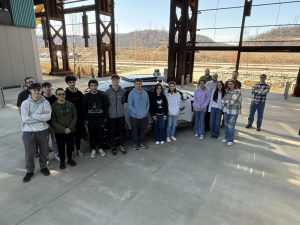Boom! That’s what happened to the international, local, and national economy when Marcellus Shale struck Western Pennsylvania.
When the Marcellus Shale industry skyrocketed within Western Pennsylvania, it impacted the economy vastly in numerous ways. Not only did Marcellus Shale create jobs within the Oil & Gas industry, it created thousands of jobs in every industry. The discovery and exploration of Marcellus Shale, natural gas, boosted the nation, as a whole, out of the abyss of a recession. Many of the “big dog” companies like Chevron, Exxon Mobil, BP Gas, Range Resources, and Williams rolled into Pittsburgh not too long ago. Additionally, the discovery of Marcellus Shale in Western Pennsylvania created jobs for at least another 20 years.
This article will feature a timeline and background of Marcellus Shale, how to get into the Oil & Gas industry, the outlook of Marcellus Shale, and job prospects.
Timeline/Background:
What is Marcellus Shale? Marcellus Shale is is an organic-rich black shale that was deposited 390 million years ago.
Where is Marcellus Shale located? Marcellus Shale is prevalent throughout the Appalachian basin and most of Western Pennsylvania.
How deep/thick is the Marcellus Shale? The thickness of Marcellus Shale is less than 10 feet in Western Pennsylvania. However, in northeastern Pennsylvania Marcellus Shale can be a whopping 250 feet deep.
How much gas is in Marcellus Shale? This usually depends upon natural gas prices. With that being said, a U.S. Geological Survey has reported estimates of recoverable gas reserves at 1,925 billion cubic feet.
How is natural gas extracted from Marcellus Shale? Essentially, the shale operators drill a vertical well into the ground. After the operators reach a certain depth, they use a certain technique called horizontal drilling, the process of drilling straight across after drilling vertically, which is combined with multiple stages of fracturing techniques. Therefore, vertical wells will cost a company arournd 800,000 dollars and horizontal wells will cost around three to five million. Typically, horizontal wells usually take thirty to forty-five days to complete.
Oil & Gas Industry:
As most people know, oil is a non-renewable resource, a natural resource, that cannot be grown, produced, or generated; this means that oil prices skyrocket and plummet within different times of the economy. Additionally, oil is limited and eventually will run out. However, the oil and gas industry is extremely profitable and will grow even more over the next ten years due to the exploration of Marcellus Shale.
One might ask themselves, how does one get into the Oil & Gas Industry? To get involved in the oil and gas industry, one should excel in the sciences during their high school and college careers.
To obtain a job after college, one should consider majoring in engineering, more specifically petroleum or chemical engineering.
There are three types of oil and gas jobs within the industry: upstream, downstream, and midstream.
Upstream is the recovery and production of crude oil and natural gas. The upstream sector includes the searching for potential drilling sites as well. Usually, the upstream sector is referred to as the exploration and production (E&P) sector.
Downstream is the refining of crude oil and the selling and distribution of natural gas or products derived from crude oil. These products could but not only include gasoline or petrol, jet fuel, diesel oil, and asphalt. Essentially, the downstream sector sells the numerous products to consumers and the upstream sector actually recover the crude oil.
Lastly, midstream processes, stores, markets, and transports the crude oil and natural gas.
Furthermore, to get into the oil and gas industry, one doesn’t have to only work in the field and get “down and dirty.” There are hundreds of thousands of jobs that involve managing projects, developing project scopes, creating schedules, and estimating costs.
Most of the time, the upstream sector involves petroleum engineers that travel on oil rigs for two weeks at a time. These engineers usually live in Houston, Texas or Alaska and are employed by Chevron, Exxon Mobil, or BP Gas. This job can be very stressful due to the long hours and time away from the home but very rewarding due to the large salary.
In addition, the downstream sector involves a variety of engineers that manage Marcellus Shale and natural gas projects. These engineers, mechanical, environmental, or chemical, are employed in places like Pennsylvania, Ohio, West Virginia, and upstate New York; they are usually employed by natural gas companies like Range Resources.
Outlook of Marcellus Shale:
The outlook for Marcellus Shale is promising throughout the next ten to twenty years; however, the long term stability towards the economy is uncertain. Currently, Marcellus Shale brings an immense amount of stability towards the national and international economy. However, the controversial taxes and laws against Marcellus Shale will hinder and hamper the industry in various ways.
Numerous politicians have different views about Marcellus Shale but I think most of society can conclude that Marcellus Shale brings a plethora of positive boosts to the economy. Moreover, the exploration of this important energy resource brings jobs throughout the entire country. Over the past couple of months there have been many commercials in regards to Marcellus Shale drilling and exploration bringing stable jobs throughout the United States. Undoubetdly, most politicians would conclude that any type of energy based job will bring consistency to the economy.
Job Prospects:
The job prospects for Marcellus Shale are very promising throughout the next twenty years. Undoubtedly, Marcellus Shale will be prevalent throughout the next twenty years. However, chemical engineers are expected to have an employment decline of 2 percent over the projections decade. Moreover, petroleum engineers are expected to have employment growth of 18 percent over the projections decade, faster than the average for all occupations. The juxtaposition between the engineering occupations offers an unexpected outlook for chemical engineering and petroleum engineering.
Nevertheless, the Oil & Gas companies’ incomes will be staggering throughout the next decade. In modern day society, the Oil & Gas industry will always offer the most rewarding salaries and will always have a promising future.
For more information on Marcellus Shale, please visit the following sites:
http://marcellusshaleformation.com/












